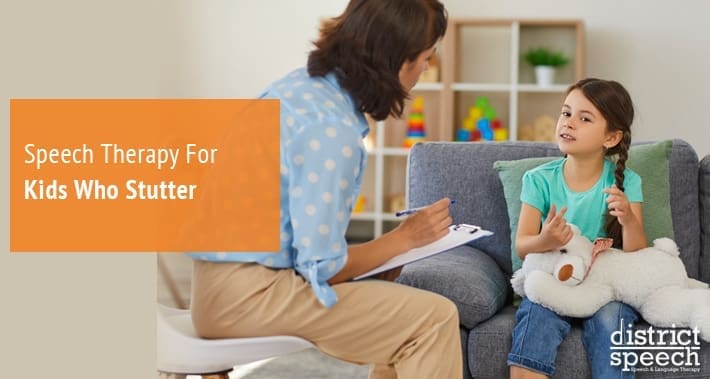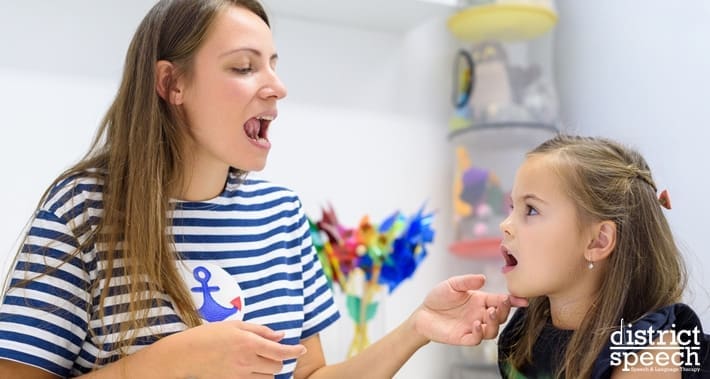
Any kind of challenge or delay with your child’s progress can be concerning.
Communication, especially expressive language, is such an important part of your child’s development.
When children have trouble communicating their needs or feelings, it can be frustrating both for them, and their caregivers.
If a child develops a stutter, it can interfere with their ability to communicate, and can be discouraging, or even embarrassing.
But speech therapy for kids can help.
A stutter can feel like a huge obstacle to efficient communication, but it can be improved through stutter avoidance and reduction speech therapy.
But stuttering in kids is a little different than stuttering in adults – let’s take a closer look.
What Is Stuttering?
Stuttering is a speech disorder that involuntarily disrupts the flow of speech.
It may cause prolonged or repeated sounds, words, or pauses.
It can also include tension in the face or hands, facial tics or tremors, and anxiety around speaking.
There are three different types of stutter: developmental, psychogenic, and neurogenic.
Let’s take a closer look at the types.
What Is Developmental Stutter?
The most common type of stutter, developmental stuttering typically presents between ages 2 and 5.
This is the age at which most language development is happening.
A stutter at this age is likely caused by a mismatch in your child’s speech and language abilities, and their communication needs or wants.
Developmental stuttering will sometimes resolve on its own, with time.
What Is Psychogenic Stutter?
Psychogenic stuttering is the least common type of stutter.
It develops after some kind of emotional trauma, or due to psychiatric illness.
What Is Neurogenic Stutter?
Neurogenic stuttering occurs when there is damage to the neural pathways in the brain.
This damage creates a disruption in the signals from the brain to the nerves and muscles used for speech.
Neurogenic stutters usually start after some sort of damage to the brain, such as a viral infection or traumatic brain injury.
A stroke can also lead to neurogenic stuttering.
They can happen at any age, but are thankfully very rare in children.
How To Tell If Your Child Has A Stutter
Many people, including children, have typical pauses in their speaking, known as disfluencies.
These pauses may look like saying a word more than once, or saying, “um” as you speak.
A stutter is more than just normal disfluencies.
Stuttering is an involuntary disruption to the flow of speech.
A stutter can present as repetition, prolongation, or a block.
Repetition can be of a single letter sound, or a single syllable word.
Prolongation is when a single sound is stretched out.
A block occurs when there’s a pause or a struggle to say a word.
These particular disfluencies are not typical, and can indicate the presence of a stutter.

What Causes Stuttering?
We haven’t yet identified a single cause for stuttering.
We’ve already seen a few of the potential causes for stuttering, including head trauma, and emotional trauma or stress.
For developmental stuttering, there is usually no single cause.
Some of the most common causes of stuttering are:
- Gender – boys are more likely to develop a stutter than girls
- Family history – children with a history of stuttering in their family are more likely to develop a stutter themselves
- Developmental delays – children with delayed development may be more likely to stutter
- Stress – children with stressful home or family lives may be at higher risk
- Dysarthria
- Childhood apraxia of speech
- Age – children who begin stuttering after the age of three and a half are more likely to stutter into adulthood
- Stuttering for longer than six months – children who continue to stutter for six months or more are more likely to continue to stutter long term
When Should I Bring My Child In For Speech Therapy?
Hearing your child develop a speech impairment can be worrying.
Stuttering won’t always resolve completely, but it can be helped with speech therapy.
The best time to bring your child in to see a speech therapist is as soon as possible.
The earlier your child gets support, the more likely it is that their stutter will resolve.
It’s a good idea to bring your child in if they have been stuttering for more than six months, or started stuttering after the age of three.
We also suggest that you seek support if your child shows signs of tension while speaking, avoids speaking, or you have a family history of stuttering.
How Can Speech Therapy For Kids Who Stutter Help?
Speech therapy for stuttering will begin with an evaluation by a speech therapist.
From there, your child’s speech therapist will build a treatment plan that is likely to involve you and your family, and your child’s teachers.
Treatment can depend on several factors, including your child’s age, and the severity and type of stutter.
Therapy for a young child may involve changing the way your child speaks (considered a ‘direct’ strategy), or making talking less demanding for your child (‘indirect’ strategy).
Examples of an indirect strategy might be asking your child fewer questions, or slowing down your own speaking to model pace of speech.
The way you receive and respond to your child’s stutter can play an important role in their treatment.
Therapy for older children focuses largely on making speaking less stressful, and learning to manage speaking with a stutter.
Book Your Appointment With District Speech Today
Helping your child deal with a speech impediment can feel overwhelming.
Of course you want them to thrive, and developing a stutter can feel like an obstacle to social and academic success.
There are ways to help support your child through a stutter, and it may even be possible to resolve a stutter as your child develops.
With the support of a speech therapist, you and your child can learn together how best to manage living and communicating with a stutter.
If you are looking for speech therapy for your child with a stutter, our team of licensed speech pathologists can help.
Book your appointment with District Speech today.
1300 I St NW, #400E,
Washington, DC 20005
- https://g.page/districtspeech
District Speech and Language Therapy specializes in speech therapy, physical therapy, and occupational therapy solutions, for both children and adults, in the Washington D.C and the Arlington Virginia areas.